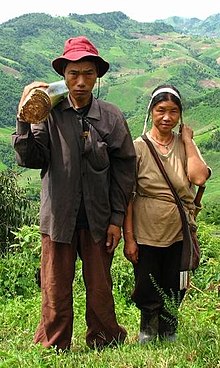his article is about modern humans. For other human species, see Homo. For other uses, see Human (disambiguation).
Humans, known taxonomically as Homo sapiens (Latin: "wise man" or "knowing man"),[3][4] are the only living species in the Homo genus of bipedal primates in Hominidae, the great ape family. Anatomically modern humans originated in Africa about 200,000 years ago, reaching full behavioral modernity around 50,000 years ago.[5]
Humans have a highly developed brain, capable of abstract reasoning, language, introspection, and problem solving. This mental capability, combined with an erect body carriage that frees the hands for manipulating objects, has allowed humans to make far greater use of tools than any other living species on Earth. Other higher-level thought processes of humans, such as self-awareness, rationality and sapience,[6][7][8] are considered to be defining features of what constitutes a "person".[9][10]
Like most higher primates, humans are social animals. However, humans are uniquely adept at utilizing systems of communication for self-expression, the exchange of ideas, and organization. Humans create complex social structures composed of many cooperating and competing groups, from families to nations. Social interactions between humans have established an extremely wide variety of values, social norms, and rituals, which together form the basis of human society. With individuals widespread in every continent except Antarctica, humans are a cosmopolitan species. As of August 2010, the [update]population of humans was estimated to be about 6.8 billion.[11]
Humans are noted for their desire to understand and influence their environment, seeking to explain and manipulate phenomena through science, philosophy, mythology and religion. This natural curiosity has led to the development of advanced tools and skills, which are passed down culturally; humans are the only species known to build fires, cook their food, clothe themselves, and use numerous other technologieshis article is about modern humans. For other human species, see Homo. For other uses, see Human (disambiguation). "Homo sapiens" redirects here. For other uses, see Homo sapiens (disambiguation). Human[1] Fossil range: 0.2–0 Ma PreЄ Є O S D C P T J K Pg N ↓ Pleistocene – Recent Human male and female Conservation status Least Concern (IUCN 3.1)[2] Scientific classification Kingdom: Animalia Phylum: Chordata Class: Mammalia Order: Primates Family: Hominidae Subfamily: Homininae Tribe: Hominini Genus: Homo Species: H. sapiens Trinomial name Homo sapiens sapiens Linnaeus, 1758 Humans, known taxonomically as Homo sapiens (Latin: "wise man" or "knowing man"),[3][4] are the only living species in the Homo genus of bipedal primates in Hominidae, the great ape family. Anatomically modern humans originated in Africa about 200,000 years ago, reaching full behavioral modernity around 50,000 years ago.[5] Humans have a highly developed brain, capable of abstract reasoning, language, introspection, and problem solving. This mental capability, combined with an erect body carriage that frees the hands for manipulating objects, has allowed humans to make far greater use of tools than any other living species on Earth. Other higher-level thought processes of humans, such as self-awareness, rationality and sapience,[6][7][8] are considered to be defining features of what constitutes a "person".[9][10] Like most higher primates, humans are social animals. However, humans are uniquely adept at utilizing systems of communication for self-expression, the exchange of ideas, and organization. Humans create complex social structures composed of many cooperating and competing groups, from families to nations. Social interactions between humans have established an extremely wide variety of values, social norms, and rituals, which together form the basis of human society. With individuals widespread in every continent except Antarctica, humans are a cosmopolitan species. As of August 2010[update], the population of humans was estimated to be about 6.8 billion.[11] Humans are noted for their desire to understand and influence their environment, seeking to explain and manipulate phenomena through science, philosophy, mythology and religion. This natural curiosity has led to the development of advanced tools and skills, which are passed down culturally; humans are the only species known to build fires, cook their food, clothe themselves, and use numerous other technologies. The study of humans is the scientific discipline of


No comments:
Post a Comment